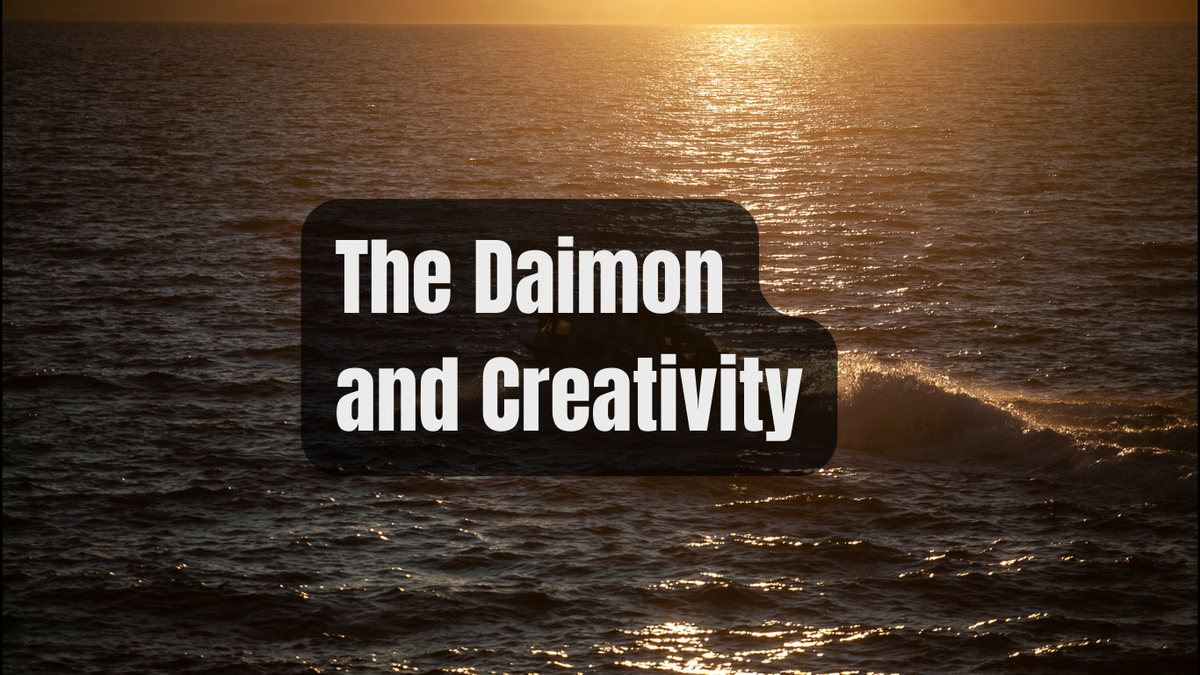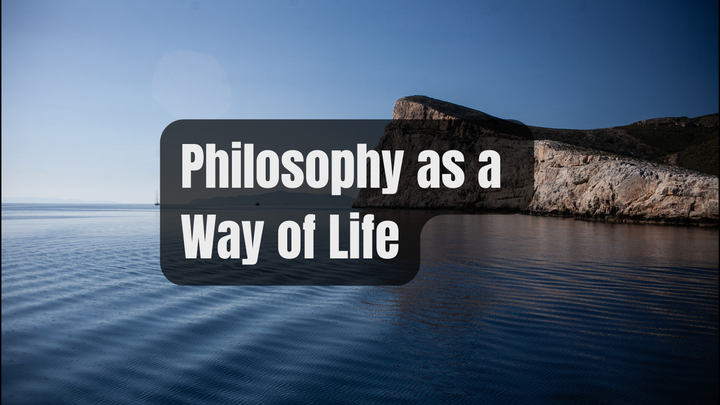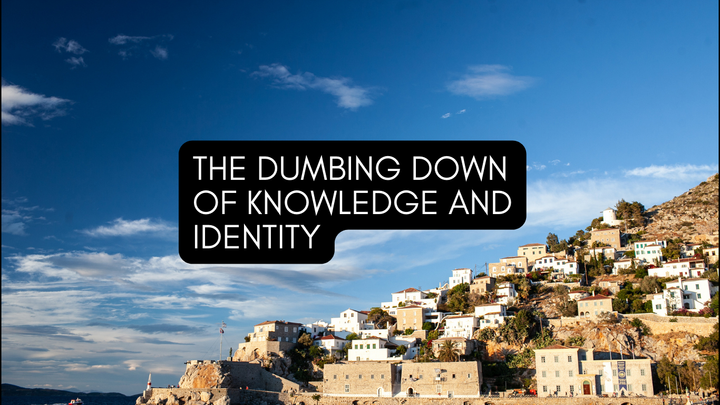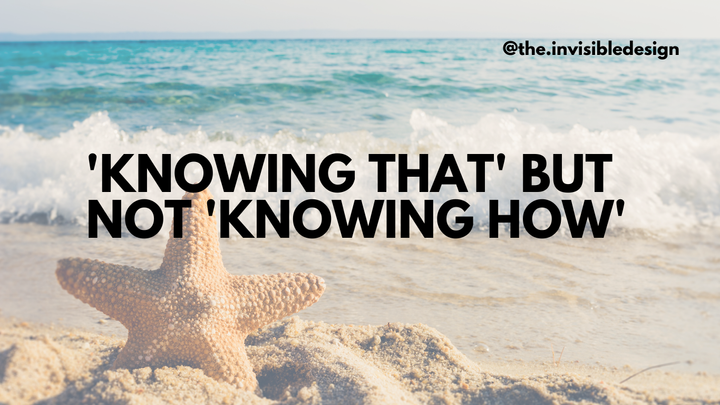The Daimon and Creativity
The thesis of this essay is that the Daimon, initially understood as a supernatural force in ancient Greece, retains its relevance and influence in contemporary times, especially in the realms of creativity and personal introspection.

Introduction
In pre-Socratic Greek thought, the concept of the Daimon is a multifaceted and complex one, encompassing various forces that can influence or guide human behavior, bringing either luck or misfortune. These forces were not necessarily personified but represented parts of the world that were unexplained, beyond our control or reasoning. "I wasn't myself when I said that." "I wrote this poem, but I feel like it wasn't me who wrote it; someone else did."
"Etymologically, daimōn means 'divider' or 'allocator'; from Homer onwards, it is used primarily in the sense of an agent of more or less unexpected and intrusive events in human life. In early authors, gods, even the Olympians, could be called daimŏnĕs. However, rather than referring to personal anthropomorphic aspects, daimōn seems to correspond to supernatural power in its unpredictable, anonymous, and often frightening manifestations. Thus, the adjective daimonios means 'strange', 'incomprehensible', 'sinister'. A fortunate person was eudaimōn ('with a good daimon': already in Hesiod), an unlucky one was kakodaimōn ('with a bad daimon': from the fifth century BC)."
Anthony A. Long offers a clear explanation of the origin of eudaimonia in "Greek Models of Mind and Self" (2015): "Most literally, Eudaimonia means a divinely favored disposition. The 'daimon' component of the word combines a generic sense of divinity with the notion of fate or luck. By prefixing 'eu', which qualifies an activity or condition as excellent, the Greek language had a composite term to express the idea of the best possible human life, a condition of flourishing, prospering, doing exceedingly well." (Long 2015, 166)

Lydia Amir, in "Philosophy, Humor, And The Human Condition - Taking Ridicule Seriously," offers an interesting perspective on the concept of Eudaimonia. The idea of Eudaimonia is presented as derived from Homer's vision of the discrepancy between gods or immortals and humans, suggesting that humans can at most emulate and approach the ideals represented by Homeric gods. This conception underlines the belief that there is a connection between the best possible life in the universe—the divine life—and the best life that humans can achieve or aspire to achieve.

Thus, the Daimon is a God, Spirit, an external Force that takes hold of you, coming upon you sometimes at the most inopportune moments. When it comes and is present, you feel that you are not "in your right mind", you are not yourself, you are lost, either in a good, creative sense, where suddenly you have all the inspiration condensed in a few moments and manage to create, express, and render fluently and smoothly everything you have internalized, or in a bad, even violent sense.
What is important to remember in this context is that for us, this concept of daimon is perhaps metaphorical, an idea, a concept, but for the Greeks of that period, things were real, physical, and the goddess Athena literally comes, appears to you, and grabs you by the hair, as she did with Achilles. It is a real mental construct.
Daimon as a Spiritual and Moral Guide in Ancient Greece
Heraclitus described the Daimon as more than an entity, but indeed fate, a primary character that guides decisions and actions. Not just an external being but an internal trait, connected to our identity and human nature. Socrates, however, describes this daimon as a voice that warned him when he was about to make a mistake or when he was about to act against a proper course of action. The daimon never told Socrates what to do, but rather what not to do. This interpretation was considered controversial in ancient Athens, ultimately playing a role in his condemnation to death.
In 'The Apology of Socrates,' he explains the role of his Daimon in his decisions, saying: "Whenever this voice is heard, it stops me from what I am about to do and never urges me forward." Therefore, for Socrates, the Daimon was not a mere superstition but a part of life and his thinking process, an element that guided his actions.
In the article "Socratic Knowledge and the Daimon," author D. Philip Kenny presents Socrates' relationship with his daimon and emphasizes Socrates' commitment to a life of moral investigation and virtue. The article articulates how the daimon serves as a bridge between the divine and Socrates' philosophical methodology, highlighting the role of divine guidance in the pursuit of ethical knowledge. This relationship between Socrates and the daimon (or daimonion, as Kenny uses the term) illustrates his philosophical position and provides insight into the integration of ethical guidance and philosophical inquiry. We can see how divine influence can coexist with human reason in the pursuit of truth and virtue.
The Daimon is also presented from other perspectives. In "Greek Religion: Archaic and Classical," Walter Burkert explains how the daimon is not delineated as a specific divine entity but represents rather a manifestation of divine activity. The daimon becomes a key concept for understanding how the ancient Greeks perceived and experienced divine intervention in their world, adding an extra layer of complexity. Thus, Burkert offers a way to see the daimon not just as a symbol or metaphor but as an expression of divine presence in the nuances of everyday life.

Walter Burkert presents in the same chapter how the Daimon is considered the hidden face of divine activity, without a specific image. In exceptional cases, the Daimon appears represented in the form of a serpent. Additionally, he presents the concept of daimon as closely related to the idea of fate and destiny. In Greek tragedies, the daimon becomes an independent entity, a kind of vengeful spirit bringing misfortunes, although these are also considered "worked by the gods." For example, in the works of Aeschylus, the daimon appears as a vengeful spirit that brings suffering upon a house.
Burkert continues with other interpretations such as those from Hesiod's myths, which led to the honoring of powerful and great figures, after their death, as daimons. This is reflected in the way fallen heroes on the battlefield were venerated as daimons in funerary inscriptions.
Simplifying Human Nature Through Daimon
In contrast, some modern perspectives view the concept of daimon as a simplification of human nature and a way to avoid personal responsibility. Contemporary philosophers like Bernard Williams argue that instead of acknowledging the complexity of human choices and inner motivations, such an approach reduces human behavior to mere reactions to external forces, thus neglecting man's capacity for making independent moral and rational choices. This viewpoint suggests that in the modern era, oriented towards science and reason, we should focus on more rationally grounded explanations for human behavior, rather than relying on mythological or metaphysical concepts.
Responsibility and Influence
E.R. Dodds justifies in 'The Greeks and the Irrational' the actions of Agamemnon through this Daimon. When he abducts Achilles' beloved, Agamemnon, under divine temptation or infatuation (ate), argues that it was not entirely he who made this gesture, but Zeus, Fate, and Fury, more precisely, the gods and stronger forces that took hold of him and influenced his decisions, i.e., the Daimon.

At first glance, as Dodds also argues, Agamemnon seems to provide weak justifications that would not be accepted in our times. However, Agamemnon does not deny the consequences of his actions but explains the forces that drove him to act this way.
By acknowledging his mistakes, Agamemnon emphasizes that although influenced by higher forces, he takes responsibility for his actions. This approach seems contradictory: he acts under the influence of a higher force, a Daimon, but he acknowledges his personal responsibility. This aspect highlights the subtlety of the daimon concept, which, when it comes and influences destinies, decisions, and actions, acts in a way that those "possessed" by the Daimon lose control but at the same time remain aware that they are responsible for their own deeds.
Another good example related to Daimon is the moment in Iliad 1, where the goddess Athena intervenes to guide Achilles on the right path. She stops him from attacking Agamemnon. Athena's unseen appearance, encouraging him to fight using words, not the sword, embodied reason, the mind, and the way to defeat an adversary mentally.
When we think of Daimon, we naturally wonder about free will if this higher force controls us. However, for the Greeks, these concepts did not exist.
"And when Agamemnon blames moira, he does not declare himself a systematic determinist any more than the modern Greek peasant does when using similar language. The question of whether Homer's heroes believe in determinism or free will is an anachronism; not only did they never ask it, but even if asked, they would not understand what it means. What they did understand was the difference between natural actions and actions committed in a state of ate. Actions of the latter type are indiscriminately attributed to moira or the will of the gods, depending on whether the issue is viewed subjectively or objectively."
Thus, before the concepts of determinism or free will, in ancient Greece, everything referred to the action you take when you are alone and those in which you are "accompanied" by the Daimon, in which this force appears, greets you, and influences you.
Furthermore, Walter Burkert, in 'Greek Religion: Archaic and Classical,' in the chapter on Daimon, explains how the Greeks viewed the daimon not as an explicit mythological figure but as an occult force, a presence that drives human destiny forward. This subtle nuance is evident in the use of the term 'daimonie' in Homeric epics—often a term of reproach, not praise, applied when a person's actions are inexplicable. In these moments, the daimon reveals itself as a latent power, a partner or antagonist of human will, particularly when a god favors the opponent. For example, illness can be described as a 'detestable daimon' attacking a victim, but relief is offered by the theoi, the gods. Each god has the capacity to act as a daimon, but not every divine action signals the presence of a daimon. Thus, the daimon emerges as a hidden face of divine activity, an indispensable element for a complete understanding of the Homeric vision of the gods—beings with personal attributes but also encompassing those unclear, hard-to-define, and name segments.
Daimon as a Source of Artistic Inspiration and Creativity in the Modern Age
Carl Jung reintroduced and reinterpreted this concept, and the Daimon thus finds resonance in our days in various forms, especially in modern psychology. For Jung, the equivalent of the Daimon is a force or a being from the Universe that determines our destiny or fate, an entity that acts within us with an authority greater than human intellect, similar to Heraclitus's vision. Jung also emphasized the close connection between the daimon and creativity.
The Daimon is perceived as a "guardian angel" or "genius," our better part or inner voice, the heart or "higher self." It helps build our strength, guiding us through challenging situations and providing the necessary guidance to overcome them. The Daimon stimulates the dialogue between the ego and the unconscious, a process that can heal and integrate the person. Jung also emphasized the close connection between the daimon and creativity.
Thus, the concept of the daimon from ancient Greece continues its influence in contemporary psychology and philosophy, serving as a metaphor for the inner forces shaping destiny, creativity, and personal development.
As Jung supported the connection between this higher force and creativity, Elizabeth Gilbert, the author of 'Eat, Pray, Love,' popularized in our days, through her TED Talk on creativity and genius, the philosophical concept of the Daimon.
In that talk, she argues the idea of creativity as not necessarily an internal aspect of an individual but rather an external entity or 'genius' collaborating with the individual, an idea resonating with the concept of the daimon.
The writer very articulately supports the idea that it is difficult to live in a world where failure lurks, and at the level of creativity, if we cannot detach and accept that we do not decide when we are creative, we end up going mad and living in fear. An author's greatest fear is to write the book of their life and then never again have the same inspiration, to fail to surpass themselves creatively and manage to continue delivering art at a higher level than the previous creation.
Thus, Gilbert proposes the idea of the Daimon to live in peace—arguing that if we look from the perspective of the Daimon, we are not solely responsible for creativity, and if we are not touched by the Daimon, we will not manage to surpass our creative limits and despite efforts, it does not depend on us.
The writer explains this concept of the daimon even more inspiringly but contemporarily through Tom Waits, an artist who, for most of his life, as Gilbert describes him, was the incarnation of the modern contemporary tormented artist trying to control creativity. However, at one point, while driving, everything changed: suddenly he hears an elusive melodic line, like an inspiration, seductive but he couldn't capture it.
The reaction was delightful: "Excuse me, can't you see I'm driving? Do I look like I can write a song right now? If you really want to exist, come back at a more convenient time when I can take care of you. Otherwise, go bother someone else today. Go bother Leonard Cohen."
Creativity and Decision: Self-Discovery at Conscious Reason
Andrew Huberman, a well-known researcher from Stanford, presented in his podcast, The Huberman Lab, in the episode “Enhance your creativity” several modern neuroscientific studies showing that we can improve creativity through concrete methods.
Techniques such as promoting divergent thinking, which involves generating a large variety of new ideas, and convergent thinking, focused on finding optimal solutions to complex problems, assimilating new information, moving or keeping a journal have been proven to enhance creativity. These approaches, based on understanding cognitive processes, offer an earthly and practical alternative to the idea of a supernatural source of inspiration, highlighting the inherent capacity of the human brain to produce creative ideas through conscious and deliberate effort.
Daimon as a Metaphor for the Creative Process
Although pragmatic approaches show ways to improve creativity through earthly techniques, the concept of the daimon remains relevant as a metaphor for the inner creative process. The Daimon, understood as a metaphor, can represent an individual's creative energy, a force that, although originating from within, possesses a transcendent and mysterious quality. Thus, even in an era dominated by science and pragmatism, the symbolism of the daimon offers a poetic language to describe the complexity of the creative experience, balancing rational perspectives with metaphorical ones and enriching our understanding of the nature of human creativity.
Moreover, the concept of the daimon, as perceived today, is not limited to fields where perfect creativity is necessary, such as art, or even science. In the podcast The Jungian Life, episode DAIMON: Demon or Destiny?, Lisa Marchiano, Jungian Analyst, offers a superb perspective on the Daimon.
She states that in a world that often applauds brilliance and exceptional artistic talent, it is easy to lose ourselves in admiration for celebrities who constantly display their mastery in the spotlight. But, if Jung's teachings and other ancient value systems are correctly understood, our true mission is to achieve wholeness and live in service to our deepest self, even if it does not mean fame. Thus, it becomes very tempting to turn the spotlight towards those "stars" always present in the public eye, ignoring the significant contributions of professionals like kindergarten teachers. These people, who have dedicated their years to influencing the lives of hundreds of children, serve their inner devotion, in a profession that will probably never attract widespread public attention.
Their lives, conducted away from the public eye, are just as important, significant, real, and complete as those of a public personality.
Lisa continues with an idea also found in religion: the quote from the Gospel of Thomas which says: "If you bring forth what is within you, what you bring forth will save you. If you do not bring forth what is within you, what you do not bring forth will destroy you." We all have a daimon, but the quality of the individual daimon varies considerably. Aristotle said that happiness means living in harmony with one's own daimon. Thus, there is this necessity to respond to the daimon's demands to live in peace with ourselves and our daimon.
Conclusion
The Daimon has a remarkable capacity to traverse eras, evolving from a mystical entity of Ancient Greece to a symbol of introspection and creativity in the modern age. The daimon appears timeless, agnostic regarding the separation of good and evil, present in both situations and appearing, real, physical, as a living entity, when it wants to, if it wants to, and leaving just as subtly.
Whether we choose to believe in this Daimon is a matter of perspective, but that does not affect the Daimon in any way or when it choses to visit and influence you.



